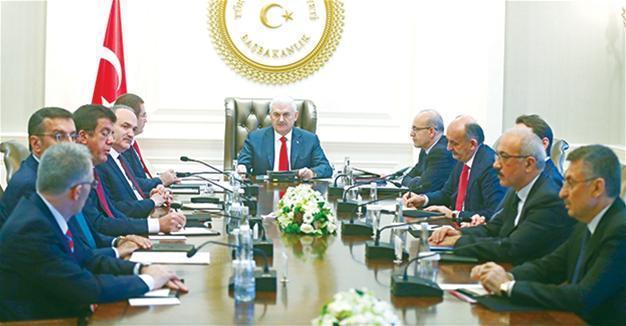Turkish government announces extraordinary measures for economy
ANKARA

AA photo
The Turkish government has revealed extraordinary measures to revive the Turkish economy, which has been hit by massive losses in the Turkish Lira, vowing to make 2017 a “saving year” for the public sector and introducing a big fund to accelerate credit volume and create 600,000 new jobs.
Announcing the results of the latest economy board meeting in Ankara on Dec. 8, Prime Minister Binali Yıldırım said the government would introduce up to 250 billion liras ($73 bln) in credit line that was particularly aimed at small- and medium-sized enterprises (SMEs) to ease the cash flow problem.
“The new fund under the Treasury’s guarantees will help the banking system re-accelerate its credit growth,” he said.
In export credits, the guarantee will be 100 percent, while it will be implemented to a degree of 90 percent in SMEs and 85 percent in trade credits, Yıldırım added.
Accordingly, the government will also give additional support to projects with an investment incentive to the manufacturing industry in a move to encourage and increase private sector investments in 2017.
“The government will increase the investment contribution rate a further 15 percent for investment expenditures in the manufacturing sector in 2017. We will thus fully implement a corporate tax cut,” said the prime minister.
Yıldırım added that the value added tax (VAT) for construction investments would be re-funded for 2017 as an additional resource for construction projects.
Social security premiums in the first quarter of 2017 will be postponed nine months with-out interest, he said.
In addition, the premier also said the Turkish Employment Agency (İŞKUR) would provide vocational training to 500,000 people in 2017 in the private sector as another 100,000 would continue to work for benefit of society program, mainly in the country’s eastern and southeastern regions.
Yıldırım also noted that the capital base of Eximbank, which is at around $3.7 billion, will be increased dramatically next year to further support exporters.
“We will also put zero interest rates on foreign exchange loans which are offered to Turkish construction companies operating abroad for their Turkey-made goods and services acquisitions. They will not be charged any interest rate for the loans, which are used by these companies for locally made goods and services to be used abroad. These costs will be covered by Exim Bank as well,” he said.
“Our main aim is here to diversify our exports, raise their added value and increase our export volume,” he added.
2017: Cost-cutting year
The state will make considerable savings in 2017, said Yıldırım, adding that the public sec-tor would not buy anything unnecessary.
“When we are asking something from our people, what are we going to do? For the state, 2017 will be a considerable year of savings. We will cut costs dramatically. For in-stance, we will not conduct spending on new buildings or cars if it is not a must … We will also cut travel costs. As the representatives of the state, we must do what is needed when asking our citizens to convert their foreign currencies into lira,” he said.
Yıldırım said fiscal discipline would be kept strictly in the next year.
State institutions will not make contracts in foreign currencies unless necessary, he said.
“Besides, some public institutions have already started to convert their foreign exchange assets into liras. Thus, we have recently created over $10 billion of assets in liras. This has also enabled us to pump more forex into the markets as well,” added Yıldırım.
Regarding the reform agenda, Yıldırım said the basics of the reform agenda were to limit the state’s definite involvement in the economy, enabling citizens to move at will and re-duce bureaucratic burdens for them.
“There are two areas that we cannot abandon: justice and security. These two key areas will be in the hands of the state and will not be a part of any reform move. We will take the required measures to let them function properly and quickly within themselves,” he said.
Top economy ministers and officials held the meeting late on Dec. 2 amid sharp decreases in the value of the Turkish Lira, which has been closely followed by the markets. The lira has recently been one of the worst hit emerging currencies due to several global and domestic developments, especially since the U.S. presidential elections.
